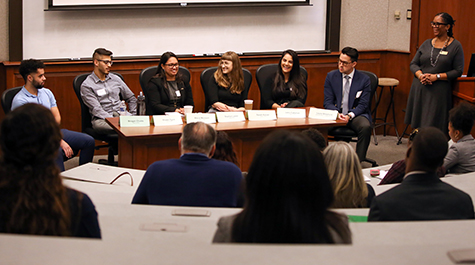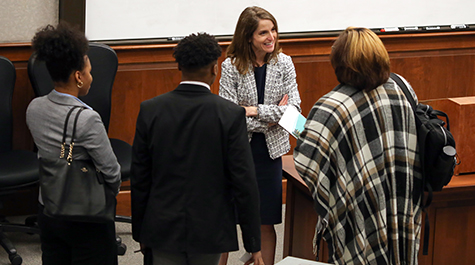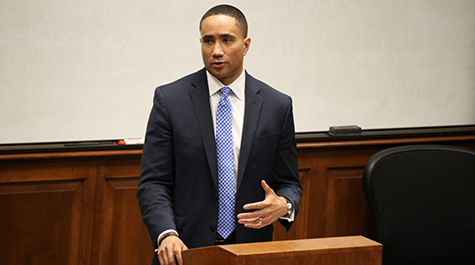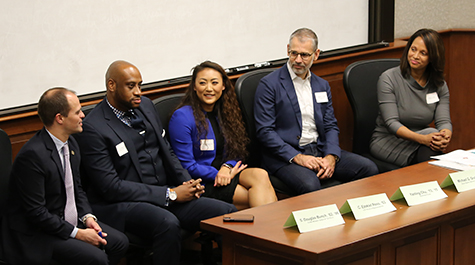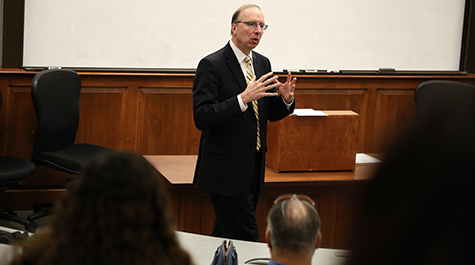Law School Hosts “Diversity and Inclusion Law Day,” Part of LSAC "Diversity Matters" Initiatives
The Law School recently welcomed more than 60 college students and others interested in learning about legal education and the J.D. program to “Diversity & Inclusion Law Day.” Hosted by the Law School’s Office of Admission, the all-day program was co-sponsored by the Law School Admission Council (LSAC). LSAC sponsors more than 100 “Diversity Matters” events each year at law schools in the U.S. and Canada “to encourage students from diverse communities that are underrepresented in the legal profession to consider law as a career.” The Law School's diversity outreach and pipeline programs in prior years have included LSAC's "Discover Law," the Black Law Students Association's Law Day, and other events.
Law School Dean Davison M. Douglas and S. Douglas Bunch ’02, J.D. ’06, a member of the William & Mary Board of Visitors, welcomed guests and spoke about the power of a law degree to promote the public good. The program also featured panels with William & Mary Law School alumni and students, lunch with guest speaker State Senator William C. Smith, Jr. ’04, J.D. ’09, of Maryland, and presentations by Chancellor Professor of Law Laura A. Heymann, members of the admission staff, and the Moot Court and Trial Teams. The day ended with a Student Organization Fair, featuring a number of the Law School’s more than 50 student groups.
Advice on navigating law school and your career
Attendees had a chance to explore what it takes to be successful as a student and as a lawyer during a morning panel featuring William & Mary law alumni and an afternoon panel featuring William & Mary law students. Panelists fielded questions from the audience and shared their insights and advice on a wide range of topics, including deciding which law school is the right fit for you, adjusting to new surroundings, navigating times of uncertainty and stress in law school and later life, finding support and inspiration, and understanding how your career aspirations may evolve and change during law school and over the course of your career.
C. Ezekiel Ross ’03 was among the alumni panelists. He is Investigative Counsel for the U.S. House of Representatives Committee on Ethics. There were no lawyers in his family growing up, and he recalled how important it was for him as a teenager to have a male attorney who was African-American visit his high school to talk about law as a career choice. Years later, he took on that role, and with a number of his law school classmates visited a Williamsburg-area high school once a month to talk to students about how to become a lawyer and, he said, “to let them know it was something they could ultimately achieve, whether at William & Mary or at some other school.” One piece of advice he had for law students was to keep in mind that their classmates and the people they met during their summer jobs form a fundamentally important network. “Staying in touch and having genuine relationships with your law school classmates and co-workers” is important, he said.
Also contributing was Alicia Morejon, a second-year law student, staff member on the William & Mary Journal of Race, Gender and Social Justice and President of the Black Law Students Association. She is also active in the Latino Law Student Association and the Immigration Law & Service Society. During the student panel, she fielded a question that also had been posed earlier to alumni panelists: what fueled the desire to keep going when faced with a formidable challenge during law school? Morejon’s answer: “Every time I see [U.S. Supreme Court Justice] Sonia Sotomayor’s name in my textbook, I literally put a heart around it. It’s my little way of saying my participation matters. When I was able to speak Spanish to a client over the summer—that matters. When they see me and see themselves in me—that matters.“ When challenges arise, she reminds herself that there are still far too few people of color in the legal profession. "If I were to quit, who would fill my spot? It is not going to be someone who looks like me.”
Law degrees hone skills to help you make a difference
Alumnus S. Douglas Bunch, who earned both his undergraduate and law degrees from William & Mary, talked about his life as part of his remarks at the start of the day. Raised in rural Virginia, he was the first person on his father’s side of the family to go to college. He is now a partner in the Washington, D.C., office of Cohen Milstein, where he prosecutes securities fraud class actions and works on other class action litigation.
It was in law school, he told the audience, that he learned how to take his “skills of logic and reasoning and argument and advocacy and apply them to help people.” The country in its current state, he said, “desperately needs lawyers who know their adversaries’ arguments better than they do and can go head to head with the powerful and the privileged and the defenders of the status quo, particularly when the status quo is unjust … and defeat their arguments soundly.” Bunch said that a legal education and the daily give-and-take of class discussions during law school help mold you into a person who can advocate effectively for “the just result.”
About the Office of Admission
Our staff welcomes your interest in William & Mary Law School! Please visit our website to learn more about arranging a tour, a class visit, or an information session with one of our admission deans.
LSAC Resources
You can learn more LSAC’s “Diversity Matters” initiatives, law school, and the Law School Admission Test (LSAT) at www.lsac.org.
About William & Mary Law School
Thomas Jefferson founded William & Mary Law School in 1779 to train leaders for the new nation. Now in its third century, America's oldest law school continues its historic mission of educating citizen lawyers who are prepared both to lead and to serve. Visit our About page to learn more about the Law School's history.
